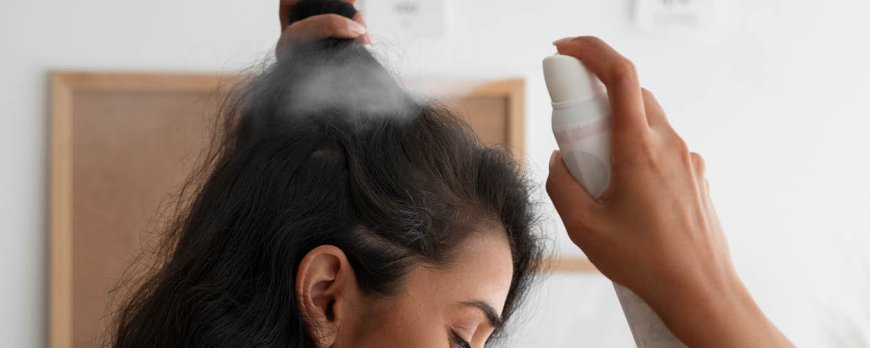What are the symptoms of biotin deficiency?
Explore 'What are the symptoms of biotin deficiency?' Discover signs, understand risks and delve into why maintaining biotin levels is crucial for your health.

What are the symptoms of biotin deficiency?
Biotin deficiency can lead to a range of symptoms that indicate the body's lack of this essential nutrient. While it is rare in individuals who consume a balanced diet, certain health conditions and medications can increase the risk of biotin deficiency. The most common cause is biotinidase deficiency, which is characterized by symptoms such as hypotonia, seizures, hair loss, and developmental delay in infants.
Other factors that can contribute to biotin deficiency include being on parenteral nutrition, taking anti-seizure medication, long-term antibiotic use, certain gastrointestinal conditions, excessive alcohol consumption, and pregnancy. In adults, symptoms may include thinning hair, scaly rash, conjunctivitis, seizures, skin infections, brittle nails, and neurological problems.
Treatment for biotin deficiency involves the use of biotin supplements and maintaining a balanced diet that includes biotin-rich sources like eggs, fish, meat, nuts, and vegetables. However, it's important to note that there is limited evidence supporting the use of biotin supplements for improving hair, skin, and nail health.
Key Takeaways:
- Biotin deficiency can cause a range of symptoms in individuals.
- Biotinidase deficiency is the most common cause of biotin deficiency.
- Other factors that increase the risk of biotin deficiency include certain medications and health conditions.
- Symptoms of biotin deficiency in adults may include thinning hair, scaly rash, conjunctivitis, seizures, skin infections, brittle nails, and neurological problems.
- Treatment for biotin deficiency involves the use of biotin supplements and a balanced diet.
Understanding Biotin Deficiency
Biotin deficiency can have significant effects on overall health and wellbeing, manifesting through various signs and symptoms. While it is rare in healthy individuals who consume a balanced diet, certain health conditions and medications can increase the risk. The most common cause of biotin deficiency is biotinidase deficiency, which primarily affects infants and can result in symptoms such as hypotonia, seizures, hair loss, and developmental delay.
Factors that can contribute to biotin deficiency include being on parenteral nutrition, taking anti-seizure medication, long-term antibiotic use, certain gastrointestinal conditions, excessive alcohol consumption, and pregnancy. In adults, biotin deficiency can present with thinning hair, scaly rash, conjunctivitis, seizures, skin infections, brittle nails, and neurological problems. These symptoms can significantly impact daily life and require prompt attention.
Biotin Deficiency Symptoms in Infants
Biotinidase deficiency can be especially concerning in infants, as it can lead to severe developmental delays and neurological problems. As a result, it is essential for parents and caregivers to be aware of the signs, such as hypotonia or low muscle tone, seizures, and delays in reaching developmental milestones. Additionally, hair loss may also occur, which can be alarming for parents.
- Hypotonia or low muscle tone
- Seizures
- Developmental delays
- Hair loss
Treating biotin deficiency involves addressing the underlying cause and restoring biotin levels in the body. Biotin supplements can be prescribed to help replenish biotin levels, and a balanced diet that includes biotin-rich sources like eggs, fish, meat, nuts, and vegetables is recommended. However, it is important to note that while biotin deficiency can affect hair, skin, and nails, there is limited evidence supporting the use of biotin supplements specifically for improving these areas. Therefore, it is essential to consult with a healthcare professional for an accurate diagnosis and appropriate treatment.

Biotinidase deficiency: A common cause of biotin deficiency
Biotinidase deficiency is a leading cause of biotin deficiency and is characterized by a range of symptoms, particularly in infants and young children. This genetic condition affects the body's ability to recycle biotin, a vitamin that is essential for the metabolism of fats, carbohydrates, and proteins. Without enough biotin, various bodily functions can be disrupted, leading to the manifestations of biotinidase deficiency.
Common symptoms of biotinidase deficiency include hypotonia, which is decreased muscle tone, seizures, hair loss, and developmental delays in infants. These symptoms may appear within the first few months of life and can be quite alarming for parents. It is important for healthcare providers to be aware of these symptoms and consider biotinidase deficiency as a potential diagnosis for infants presenting with such symptoms.
In addition to genetic causes, there are other risk factors that can contribute to biotin deficiency. These include being on parenteral nutrition, taking anti-seizure medication, long-term antibiotic use, certain gastrointestinal conditions, excessive alcohol consumption, and pregnancy. These factors can either decrease biotin absorption or increase biotin utilization, resulting in lower biotin levels in the body.
Identifying and addressing biotinidase deficiency is crucial to prevent long-term complications. Treatment typically involves lifelong biotin supplementation, which helps to restore biotin levels in the body and alleviate the associated symptoms. It is also important to maintain a balanced diet that includes biotin-rich sources such as eggs, fish, meat, nuts, and vegetables. However, it is worth noting that while biotin deficiency can affect hair, skin, and nail health, there is limited evidence to support the use of biotin supplements for significant improvements in these areas.
Factors that increase the risk of biotin deficiency
Several factors can increase the likelihood of biotin deficiency, including certain health conditions, medication use, and lifestyle choices. Individuals with conditions such as biotinidase deficiency, which is the most common cause of biotin deficiency, are at a higher risk. Biotinidase deficiency is characterized by symptoms such as hypotonia, seizures, hair loss, and developmental delay in infants.
Medication use can also play a role in biotin deficiency. Anti-seizure medications, such as phenytoin and carbamazepine, can interfere with biotin absorption and increase the risk. Additionally, long-term antibiotic use can disrupt the normal balance of gut bacteria, which can affect the production and availability of biotin.
Lifestyle choices can also contribute to biotin deficiency. Excessive alcohol consumption can damage the liver, which is involved in the metabolism of biotin. Certain gastrointestinal conditions, such as inflammatory bowel disease and celiac disease, can impair the absorption of nutrients, including biotin. Lastly, pregnancy can increase the demand for biotin, putting pregnant women at a higher risk of deficiency.
Common factors that increase the risk of biotin deficiency:
- Biotinidase deficiency
- Anti-seizure medication use
- Long-term antibiotic use
- Excessive alcohol consumption
- Inflammatory bowel disease
- Celiac disease
- Pregnancy
It is important to be aware of these risk factors and to recognize the symptoms of biotin deficiency. Detecting biotin deficiency early can help prevent further complications and allow for prompt treatment. If you suspect that you may be at risk or experiencing symptoms of biotin deficiency, it is advisable to consult with a healthcare professional to determine the appropriate course of action.

Symptoms of Biotin Deficiency in Adults
Biotin deficiency in adults can lead to a range of symptoms, affecting both physical and neurological aspects of health. It is important to recognize these signs early on to prevent further complications. Here are some common symptoms of biotin deficiency:
- Thinning hair: Biotin plays a crucial role in maintaining healthy hair follicles. A lack of biotin can result in hair thinning and even hair loss.
- Scaly rash: Biotin deficiency may manifest as a scaly rash, typically around the eyes, nose, mouth, and genital area.
- Conjunctivitis: Inflammation of the eye, known as conjunctivitis, is another possible symptom of biotin deficiency.
- Seizures: Neurological symptoms can include seizures, which may occur as a result of inadequate biotin levels in the body.
- Skin infections: Biotin deficiency can weaken the immune system, making individuals more susceptible to skin infections.
- Brittle nails: Biotin is essential for maintaining strong and healthy nails. A lack of biotin can lead to brittle nails that are prone to breakage.
- Neurological problems: Biotin deficiency may also cause neurological problems such as depression, hallucinations, and changes in cognitive function.
If you experience any of these symptoms, it is important to consult with a healthcare professional for proper diagnosis and treatment. Biotin deficiency can be addressed through supplementation with biotin capsules or tablets, as well as ensuring a balanced diet rich in biotin sources.
Note: While biotin deficiency can have an impact on hair, skin, and nail health, it is important to note that the evidence supporting the use of biotin supplements for improving these areas is limited. It is always best to consult with a healthcare professional before starting any new supplement regimen.
Risk factors and biotin deficiency
Certain risk factors can elevate the chances of experiencing biotin deficiency, including specific health conditions, medications, and lifestyle factors. Individuals who are on parenteral nutrition, which is the intravenous administration of nutrients, may be at a higher risk due to the limited availability of biotin in these formulations. Additionally, individuals who take anti-seizure medications, such as phenytoin or carbamazepine, may experience lower biotin levels as these medications can interfere with biotin absorption.
Long-term antibiotic use can also disrupt the gut microbiome, which plays a crucial role in biotin synthesis and absorption. This can potentially lead to decreased biotin levels. Certain gastrointestinal conditions, such as inflammatory bowel disease or celiac disease, can also impair biotin absorption and increase the risk of deficiency.
Excessive alcohol consumption can interfere with biotin metabolism and utilization in the body, further contributing to a deficiency. Lastly, pregnant women have higher biotin requirements to support fetal growth and development, and inadequate intake or utilization of biotin during pregnancy can result in deficiency.
Summary:
- Parenteral nutrition and anti-seizure medications can decrease biotin levels.
- Long-term antibiotic use and gastrointestinal conditions can disrupt biotin absorption.
- Excessive alcohol consumption can impair biotin metabolism.
- Pregnancy increases the demand for biotin.

Treating Biotin Deficiency
Biotin deficiency can be effectively treated through the use of biotin supplements and dietary modifications. By increasing the intake of biotin-rich foods and incorporating biotin supplements into the daily routine, individuals can support their body's biotin levels and alleviate the symptoms of deficiency.
Here are some ways to recognize and address biotin deficiency:
- Consult a healthcare professional if experiencing symptoms such as thinning hair, scaly rash, conjunctivitis, seizures, skin infections, brittle nails, or neurological problems. They can evaluate the situation and provide appropriate guidance.
- Consider taking biotin supplements. These supplements, available over-the-counter, can help increase biotin levels in the body. It is essential to follow the recommended dosage provided by the healthcare professional.
- A balanced diet plays a crucial role in maintaining optimal biotin levels. Include foods rich in biotin, such as eggs, fish, meat, nuts, and vegetables, in the daily meals.
While biotin supplements and dietary modifications can be beneficial in treating biotin deficiency, it is important to consult with a healthcare professional for proper diagnosis and guidance. They can determine the appropriate course of action based on individual needs and medical history.
Limited evidence for biotin supplements and hair/skin/nail health
While biotin deficiency can impact hair, skin, and nail health, the evidence supporting the use of biotin supplements for these purposes is limited. Biotin, also known as vitamin B7, plays a crucial role in maintaining healthy hair, skin, and nails. However, the scientific research investigating the direct benefits of biotin supplementation on these areas is still inconclusive.
The following factors should be considered when evaluating the effectiveness of biotin supplements:
- Insufficient scientific studies: Although some studies have suggested that biotin supplementation may improve hair, skin, and nail health, the number of high-quality research trials is limited. More rigorous studies are needed to establish a clear link between biotin supplementation and visible improvements in these areas.
- Varying individual responses: Biotin deficiency is rare in individuals who consume a balanced diet. Thus, the potential benefits of biotin supplements may depend on an individual's baseline biotin levels. Therefore, not everyone may experience the same level of improvement, if any.
- Other contributing factors: Hair, skin, and nail health can be influenced by multiple factors, including genetics, overall health, and lifestyle choices. Biotin supplementation alone may not address underlying issues that could be affecting these areas.
It is important to note that biotin deficiency is rare in healthy individuals who consume a balanced diet. If you suspect you have a biotin deficiency or are experiencing concerns with your hair, skin, or nails, it is advisable to consult with a healthcare professional. They can assess your individual needs and provide appropriate guidance and recommendations.

Importance of Maintaining Biotin Levels
Maintaining appropriate levels of biotin is crucial for overall health and wellbeing, as this essential nutrient is involved in numerous physiological processes. Biotin, also known as vitamin B7, is a water-soluble vitamin that plays a vital role in energy metabolism, cellular growth, and gene regulation. It is necessary for the metabolism of carbohydrates, fats, and proteins, helping to convert them into usable forms of energy.
In addition to its role in energy production, biotin is also essential for maintaining healthy skin, hair, and nails. It is involved in the production of keratin, a fibrous protein that forms the structure of these tissues. Biotin deficiency can lead to various symptoms, including thinning hair, brittle nails, and a scaly rash. Furthermore, adequate levels of biotin are crucial for the proper functioning of the nervous system, as it is involved in the synthesis and regulation of neurotransmitters.
Signs of Biotin Deficiency
- Thinning hair
- Brittle nails
- Scaly rash
- Conjunctivitis
- Seizures
- Skin infections
- Neurological problems
While biotin deficiency is rare in individuals who consume a balanced diet, it can occur in specific circumstances. One common cause of biotin deficiency is biotinidase deficiency, a genetic disorder that impairs the body's ability to recycle biotin. Additionally, certain health conditions, such as gastrointestinal disorders, and the use of medications like anti-seizure drugs and long-term antibiotics, can increase the risk of biotin deficiency. Pregnancy, excessive alcohol consumption, and parenteral nutrition can also deplete biotin levels.
To address biotin deficiency, supplementation with biotin is often recommended. However, it is important to note that while biotin deficiency can affect the health of hair, skin, and nails, scientific evidence supporting the use of biotin supplements for improving these aspects is limited. It is advisable to consult with a healthcare professional before starting any supplementation regimen to determine the appropriate dosage and ensure it aligns with individual needs.
In addition to supplements, maintaining a balanced diet that includes biotin-rich foods is crucial for preventing biotin deficiency. Good dietary sources of biotin include eggs, fish, meat, nuts, and vegetables. By incorporating these foods into your diet, you can help ensure adequate biotin levels and support overall health.
Dietary sources of biotin
Including biotin-rich foods in your diet is essential for ensuring adequate biotin levels and preventing biotin deficiency. Biotin can be found naturally in a variety of foods, making it relatively easy to incorporate into your daily meals. Here are some of the top dietary sources of biotin:
- Eggs: One large egg contains approximately 10 micrograms of biotin, making it a great choice for boosting your biotin intake.
- Fish: Certain types of fish, such as salmon and tuna, are rich in biotin. A 3-ounce serving of cooked salmon provides about 5 micrograms of biotin.
- Meat: Beef liver, in particular, is a powerhouse when it comes to biotin content. Just 3 ounces of cooked beef liver contains around 30 micrograms of biotin.
- Nuts and seeds: Almonds, peanuts, and sunflower seeds are all excellent sources of biotin. Snacking on these nutrient-dense foods can help boost your biotin levels.
- Vegetables: Leafy green vegetables like spinach and kale have a modest amount of biotin. Incorporating these veggies into your diet can contribute to your overall biotin intake.
It's important to note that cooking can sometimes reduce the biotin content of foods, so opting for raw or minimally processed options whenever possible may help maximize your biotin intake. Additionally, if you're concerned about your biotin levels or suspect you may have a deficiency, consulting with a healthcare professional is recommended to determine the best course of action.
Conclusion
Understanding the symptoms of biotin deficiency and taking proactive steps to address them through appropriate supplementation and dietary choices is crucial for maintaining optimal health.
Biotin deficiency is rare in healthy individuals who consume a balanced diet. However, it can occur in individuals with certain health conditions or who are taking specific medications. Biotinidase deficiency is the most common cause of biotin deficiency and is characterized by symptoms such as hypotonia, seizures, hair loss, and developmental delay in infants.
Other factors that can increase the risk of biotin deficiency include being on parenteral nutrition, taking anti-seizure medication, long-term antibiotic use, certain gastrointestinal conditions, excessive alcohol consumption, and pregnancy. Symptoms of biotin deficiency in adults include thinning hair, scaly rash, conjunctivitis, seizures, skin infections, brittle nails, and neurological problems.
Biotin deficiency can be treated with biotin supplements, and a balanced diet that includes sources of biotin such as eggs, fish, meat, nuts, and vegetables. However, it's important to note that there is limited evidence to support the use of biotin supplements for improving hair, skin, and nail health. Therefore, it's always advisable to consult with a healthcare professional before starting any supplementation regimen.
FAQ
What are the symptoms of biotin deficiency?
The symptoms of biotin deficiency can vary depending on the individual, but common signs include thinning hair, scaly rash, conjunctivitis, seizures, skin infections, brittle nails, and neurological problems.
What is biotin deficiency?
Biotin deficiency occurs when there is a lack of biotin in the body. It can be caused by various factors, such as certain health conditions, medications, and dietary choices.
What is biotinidase deficiency?
Biotinidase deficiency is the most common cause of biotin deficiency. It is characterized by symptoms such as hypotonia, seizures, hair loss, and developmental delay, particularly in infants.
What factors increase the risk of biotin deficiency?
Factors that can increase the risk of biotin deficiency include being on parenteral nutrition, taking anti-seizure medication, long-term antibiotic use, certain gastrointestinal conditions, excessive alcohol consumption, and pregnancy.
What are the symptoms of biotin deficiency in adults?
Adults with biotin deficiency may experience thinning hair, scaly rash, conjunctivitis, seizures, skin infections, brittle nails, and neurological problems.
How is biotin deficiency treated?
Biotin deficiency can be treated with biotin supplements and a balanced diet that includes sources of biotin, such as eggs, fish, meat, nuts, and vegetables.
Is there evidence to support the use of biotin supplements for improving hair, skin, and nail health?
Limited evidence exists to support the use of biotin supplements for improving hair, skin, and nail health. While these areas can be affected by biotin deficiency, the effectiveness of supplementation may vary.
Why is maintaining biotin levels important?
Biotin plays a key role in various biological functions, and maintaining adequate levels is important for overall health. Biotin deficiency can lead to various symptoms and potential risks.
What are the dietary sources of biotin?
Biotin can be found in foods such as eggs, fish, meat, nuts, and vegetables. Including these sources in a balanced diet can help prevent biotin deficiency.


































































































































